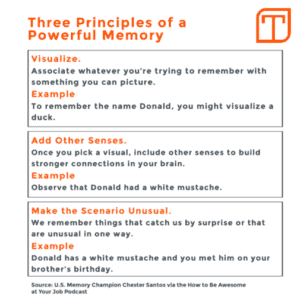A podcast episode has been circulating the Talentfoot team chat. The topic is how to improve your memory, specifically recalling names and faces. For those of us that aren’t getting any younger, these are welcome tips.
The episode from How to Be Awesome at Your Job, got me thinking about the ways our memory and brains are being tested right now.
The Strain of Stress
Over the last few months, have you had trouble recalling facts, figures, or even forming new memories? The cause may be out of your control.
Since March, the entire country has been under a fog of chronic stress. This tension has been scientifically proven to interrupt our ability to form new memories.
In her Ted-Ed video, The Surprising Link Between Stress and Memory, Elizabeth Cox shares the consequences of stress on memory. She said, “short-term stress can affect a person’s ability to recall facts.”
Chronic stress does not help the situation. It causes the brain’s prefrontal cortex to freeze. This portion of the brain is in charge of retrieving memories. A steady stream of stress makes it harder for us to recall our memories.
A Technology Crutch
Time for a little pop quiz. What is your mother’s phone number? How about one of your siblings? You probably haven’t had to dial those numbers from memory in the last several years thanks to your cell phone.
There is not conclusive evidence that technology is dismantling our memory. However, it does appear to negatively impact some of our ability to recall things.
In an interview with Vox, Anthony Wagner, chair of the department of psychology at Stanford, said, “The science tells us that there is a negative relationship between using more media simultaneously and working memory capacity. And we know working memory capacity correlates with language comprehension, academic performance, and a whole host of outcome variables that we care about.”
Now that many of us are working remotely, we are using more technology than ever before — hopping between video calls, sending Instant Messages to our colleagues, all while being glued to our phones and computers.
It’s not all bad news, Gary Small, director of UCLA’s Memory and Aging Research Center at the Semel Institute for Neuroscience and Human Behavior told Vox, “There are certain mental tasks, when using these technologies, that exercise our brains. Some studies have shown some video games and apps can improve working memory, fluid intelligence [problem-solving], and multitasking skills.”
The Most Valuable Soft Skill
No matter if you are interviewing or want to demonstrate your strengths to your colleagues, a sharp memory is a soft skill that will set you apart.
For the candidate and the employee, a strong memory makes you more likable. Colleagues and interviewers will appreciate the ability to easily retrieve memories. The skill shows your interest and attention to detail. You come across alert, engaged, and prepared.
Soft skills make you memorable in a competitive marketplace and a reliable team member. So, why not strengthen your memory?
How to Improve Your Memory
You are probably curious about the podcast that caught the attention of the Talentfoot team. The host, Pete Mockaitis interviewed U.S. Memory Champion Chester Santos. Chester shared tricks and techniques to improve your memory.
Are you skeptical? Improving your recall isn’t as tough as you may think.
“Anyone is capable of developing a very powerful memory, it’s just about learning the right techniques and putting in a little bit of fun training and practice,” Chester said.
With these fundamental principles, Chester outlined ways to help remember names, numbers, and learn new things.

If you have a list of things to remember, Chester recommends using the story technique. Put the items into a short story. To cement names to memory, repeat them, and use them in conversation.
You may notice that your memory isn’t as solid as it was a year ago. Chronic stress may be playing a part in your struggle to remember. The good news is a strong memory is a skill to build, not one you are born with.
With a little practice and dedication, you can strengthen these muscles.




